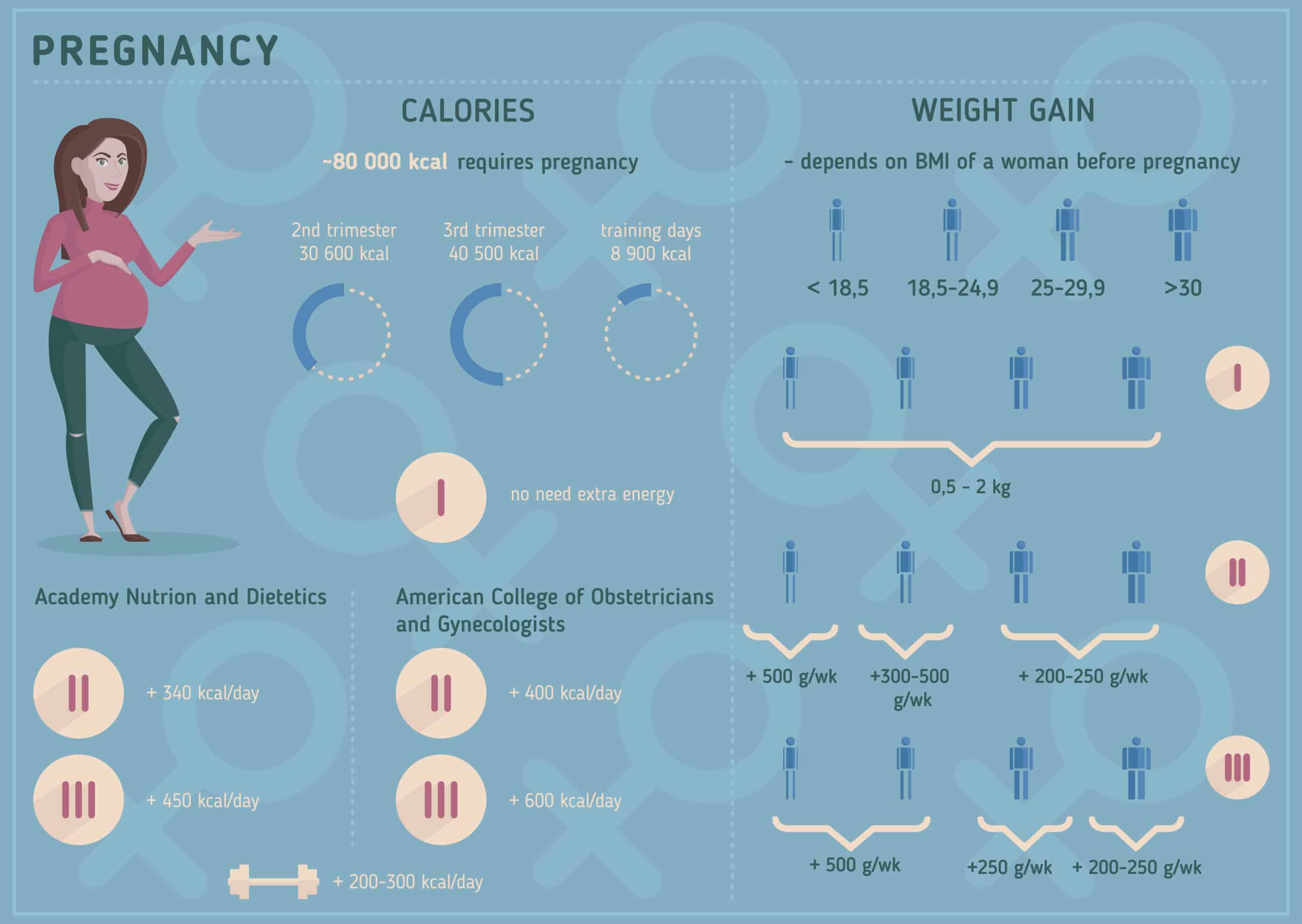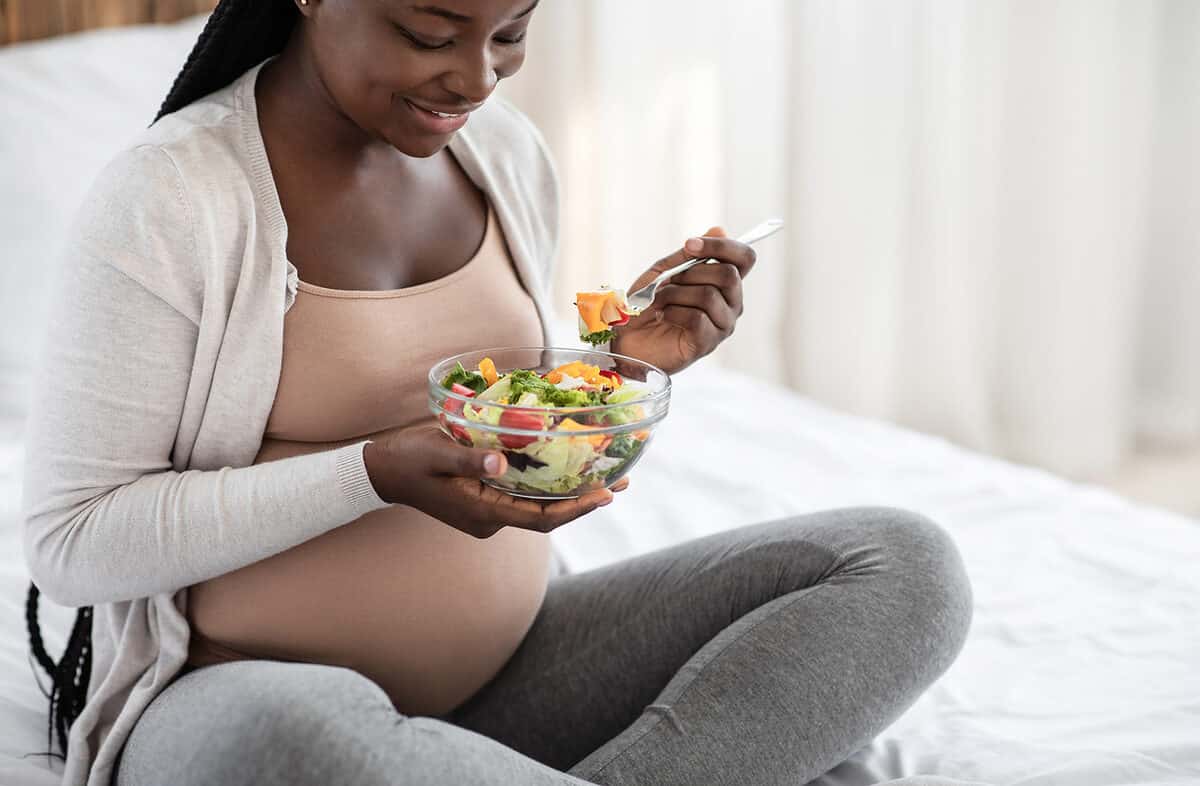Pregnancy causes many changes in the body. It is normal to gain weight during pregnancy due to the presence of amniotic fluid (fluid surrounding the baby), placenta, and the baby itself.
Because every pregnant woman's weight gain journey is different, there are no official guidelines for how much weight you should gain. The most important thing to remember is to keep your weight gain to a safe and healthy level for both you and your baby.

Healthy weight gain during pregnancy carries multiple benefits for both mother and child.
©MVelishchuk/Shutterstock.com
Is It Necessary to Gain Weight During Pregnancy?
Yes, gaining weight during pregnancy is necessary. Gaining the recommended amount of weight during pregnancy has been linked to positive outcomes for both you and your child. You will be better nourished, your baby will develop well and grow to an appropriate gestational size, and you will have an easier time carrying your baby to term and then returning to your pre-pregnancy weight.
How Much Weight Should You Gain While Pregnant?
Appropriate weight gain recommendations during pregnancy vary depending on factors such as pre-pregnancy weight and BMI, whether you are carrying twins or multiples, among others. You can calculate your BMI by dividing your pre-pregnancy weight in kilograms by your height in meters squared (or just use an online BMI calculator).
Here are some general suggestions for pregnancy weight gain (note that while BMI calculations offer helpful guidelines, they are not perfect indicators). Always consult with your doctor about the best weight-gain strategy for you:
Pregnancy Weight Gain Chart

The amount of weight a pregnant woman should gain during pregnancy varies and depends on her pre-pregnancy BMI.
©Alexpetce/Shutterstock.com
What Weight Should You Gain During Each Trimester?
The amount of weight a woman needs to gain during pregnancy, as well as the extra calories she requires, varies by trimester.
The American College of Obstetricians and Gynecologists (ACOG) provides the following general guidelines for a woman with a moderate pre-pregnancy BMI who is carrying one fetus:
- First trimester: Extra calories are not required during the first trimester. During the first trimester, they may gain no weight or only 1-5 pounds (lb).
- Second trimester: During the second trimester, a woman requires an additional 340 calories per day. They may gain 0.5-1 pound per week.
- Third trimester: An extra 450 calories per day are required during the third trimester. They may gain 0.5-1 pound per week.
According to ACOG, a woman pregnant with multiples needs to add 300 calories to her daily intake for each fetus. As a result, a woman carrying twins requires an additional 600 calories per day. A pregnant woman should consult their doctor if they have triplets or more.
A pregnant woman who is underweight or obese should consult her doctor about developing a nutrition plan.
How Pregnancy Weight Is Distributed
Your baby could weigh 7 or 8 pounds (about 3 to 3.6 kilograms). That explains some of your pregnancy weight gains. What about the rest of the weight? Here's an example of a breakdown:
- 6 to 8 pounds of fat stored (about 2.7 to 3.6 kilograms)
- 2-pound larger uterus (about 0.9 kilograms)
- 1 to 3 pounds for larger breasts (about 0.5 to 1.4 kilograms)
- 2 pounds of amniotic fluid (about 0.9 kilograms)
- Placenta weight: 1 1/2 pounds (about 0.7 kilograms)
- 2 to 3 pounds more fluid volume (about 0.9 to 1.4 kilograms)
- 3 to 4-pound increase in blood volume (about 1.4 to 1.8 kilograms)
Factors Contributing to Pregnancy Weight Gain
Many factors are likely to contribute to pregnancy weight gain. However, your pre-pregnancy body weight appears to be the most important factor.
The following are some of the possible causes of pregnancy weight gain:
- Age: The effect of age on pregnancy weight gain is unknown. Some studies show a link between inadequate weight gain and small babies in young mothers. Other studies have found that this group is not at increased risk. Furthermore, older mothers have additional risk factors for excessive and insufficient weight gain, making determining the effect of age alone difficult.
- Pregestational body weight: Your pre-pregnancy weight is the best predictor of weight gain during pregnancy.
- Exercise: Exercising while pregnant is both safe and recommended. Active mothers are less likely to gain excessive weight during pregnancy.
- Height: Most studies take height into account by recommending weight gain based on BMI. Taller women typically have larger babies. Height, on the other hand, does not appear to be a significant factor in weight gain.
- Ethnicity and/or race: According to studies, up to 50% of underweight Black and Hispanic women do not gain enough weight during pregnancy.
- The number of births (parity): Weight gain is typically greater during your first pregnancy. However, it is also dependent on your pre-pregnancy weight. Those who begin pregnancy with a low BMI are more likely to gain insufficient weight.
- Smoking: Smoking while pregnant carries several risks, including stillbirth, low birth weight, and premature birth. During pregnancy, smokers appear to gain the same amount of weight as nonsmokers. Quitting smoking, on the other hand, is a risk factor for weight gain.
What if I Don’t Put On Enough Weight While Pregnant?
Depending on where you started and how many pounds “underweight” you are, not gaining enough weight during pregnancy may increase your risk of:
- Preterm delivery: According to research, gaining less than the recommended amount of weight during pregnancy is associated with an increase in preterm delivery, which is having your baby before 37 weeks.
- Low birth weight: Gaining less than the recommended amount of pregnancy weight increases your chances of having a baby who is too small for his or her gestational age. (This applies if your baby is less than 5 pounds, 8 ounces.)

It's important to watch your weight so you're in a healthy place to carry your child to term with minimal effects.
©In Green/Shutterstock.com
For women with a BMI of “obese” or “overweight,” the American College of Obstetricians and Gynecologists (ACOG) notes that gaining less weight than recommended does not appear to hurt a baby's growth or health.
Healthy Weight Gain Tips for Pregnant Women
Here are some pointers to help you maintain a healthy weight gain while pregnant:
- After the 12th week, if you maintain a healthy weight, the extra food you require each day is roughly the same as a wholegrain tomato and cheese sandwich or a banana and a wholegrain peanut butter sandwich. If you are overweight or obese, the extra food you require is equivalent to two apples or one slice of wholegrain bread.
- It is not necessary to eat for two during pregnancy. You can eat as much as you normally would during the first 12 weeks of pregnancy. You must eat nutritious foods.
- Drink water instead of fizzy or sweetened beverages.
- Replace full-fat milk with low-fat milk.
- Eat a healthy breakfast daily, such as wheat biscuits or porridge with low-fat milk or two slices of wholegrain toast.
- Snack on crackers, cheese, fruit, low-sugar or unsweetened, low-fat yogurt, a glass of trim milk, homemade popcorn, a small wholegrain sandwich, a few unsalted nuts (e.g., 6 or 7 almonds), and so on.
- Instead of white bread, choose wholegrain bread.
- Every day, consume at least 4 servings of vegetables and 2 servings of fruit. Purchase seasonal fruits and vegetables or frozen vegetables to help reduce preparation time, waste, and cost. Tinned fruit in juice is another option. An example of a recommended fruit and vegetable serving is 1 kiwifruit (large), 1/2 cup carrots, broccoli, or peas1 medium orange, apple, banana, or potato
- Consuming dried fruit or fruit/vegetable juice contributes no more than one serving of the total recommended daily servings of vegetables/fruit.
- Eat home-cooked meals. Limit takeout to no more than once a week.
- Aim for at least 30 minutes of moderate-intensity activity 5 days per week, such as brisk walking or swimming (or as advised by your doctor, midwife, or physiotherapist). The ‘talk test' is a simple way to estimate intensity: while doing a moderately intense activity, you should be able to carry on a conversation but not sing.

Healthy meals and snacks during pregnancy help to keep weight gain steady.
©iStock.com/Prostock-Studio
Overweight or Obesity Risks During Pregnancy
Many obese women have healthy pregnancies and children. However, there are health risks associated with being overweight or obese during pregnancy.
These risks increase if you gain too much weight while pregnant, even if you were previously healthy. The greater your pre-pregnancy BMI and/or weight gain, the greater your risk of health issues or complications.
Some of the risks associated with being obese, overweight, or gaining too much weight during pregnancy include:
Medical Complications
These complications include issues with pain management during and after childbirth. For example, it may be more difficult to position women's bodies and medical equipment, as well as to maintain pain relief. There is also a higher risk of postnatal depression, longer wound healing time after cesarean, sleep apnea, pre-eclampsia, and bleeding immediately after birth.
Complications in Labor and Delivery
Overweight or obese women are more likely to have induced labor and longer labor. They are more likely to require birth interventions, such as cesareans, and to experience birth complications such as shoulder dystocia.
Pregnancy Diabetes
This is elevated blood sugar levels during pregnancy, which can have an impact on your short- and long-term health as well as the health of your baby. At 24-28 weeks of pregnancy, most women are offered a gestational diabetes test. If you have a family history of diabetes or a BMI greater than 30, you are more likely to develop gestational diabetes.
Have a Baby with Fetal Macrosomia
Fetal macrosomia is when your baby weighs more than 8 pounds and 13 ounces at birth. Having a baby this large can lead to complications such as difficulties during labor and heavy bleeding after birth.
You are less likely to have these health complications if you do everything you can to stay healthy and follow the recommended weight gain guidelines for pregnancy.
Keeping Fit During Pregnancy
The following suggestions may help a pregnant woman stay healthy:
- Consult with a medical professional: Throughout the pregnancy, a doctor will monitor a pregnant woman's weight and overall pregnancy health. A dietitian can also help you plan how to reduce or increase your calorie intake as needed.
- Consume a well-balanced diet: This includes a wide range of foods, particularly fruits and vegetables, low-fat dairy products, whole grains, and lean protein. Reduce your intake of solid fats and added sugars. Avoid foods that are unsafe to consume during pregnancy. Consume small meals regularly to aid in healthy weight gains and pregnancy issues such as morning sickness and heartburn. Eating regularly also increases your metabolism, helps to keep your blood sugar levels stable, and prevents you from becoming overly hungry and overeating foods high in sugar and fat.
- Take plenty of water: Pregnant women should drink 8-12 cups of water per day. This is necessary for the production of amniotic fluid, the circulation of nutrients throughout the body, and the removal of toxins.
- Continue to be active: Unless otherwise advised by a healthcare professional, physical activity is safe and healthy for pregnant women. Walking and swimming are two examples of safe and effective pregnancy exercises.

Mild exercise during pregnancy is highly recommended thanks to its numerous benefits.
©iStock.com/Trendsetter Images
- Take supplements as advised: A pregnant woman should consult with her doctor about the supplements she needs. During pregnancy, a woman only needs folic acid and iodine. Some may require additional supplements based on their risk factors.
When to Consult a Doctor About Pregnancy Weight Gain
At each prenatal visit, your weight and baby's growth should be monitored. You do not need to increase your weight gain if you are gaining less than the recommended amount but your baby is growing normally. If your baby is not growing properly, your doctor may advise you to change your diet and exercise routine.
If you experience any of the following symptoms, contact your doctor:
- Quickened heartbeat
- Loud snoring (a sign of possible sleep apnea)
- Headaches
- Breathing difficulty
- Dizziness
Getting to a Healthy Weight After Childbirth
It is critical to continue eating well and engaging in moderate physical activity after giving birth. This will give you more energy to devote to your new baby's care.
There are a few other options for achieving a healthy weight:
Weight loss program
It's a good idea to make a weight-loss plan once you've recovered from childbirth.
You can start walking with your baby in a sling, baby carrier, or pram in the first few weeks after birth. You could also join a community-run or private weight-loss group, or go to a gym that provides child care. Many early childhood centers offer free walking or exercise classes to new mothers.
Breastfeed
Breastfeeding, alongside a healthy diet, can aid in postpartum weight loss because it helps to burn extra calories. Until your baby is about 6 months old, breastmilk is all they need for nourishment.
You can get ideas and contacts from your family and child health nurse, dietician, or GP, or you can look online for exercise or weight loss groups near you.
Conclusion
While weight gain is necessary for a healthy pregnancy, many people find body image and weight to be emotionally charged topics. However, it is critical to be aware of these issues because too much or too little weight gain can be harmful to both you and your baby.
Maintaining a healthy lifestyle throughout your pregnancy can reduce your risk of gaining too much or too little weight. Discussing any concerns with your doctor can also help you stay on the right track.
The image featured at the top of this post is ©/Shutterstock.com
